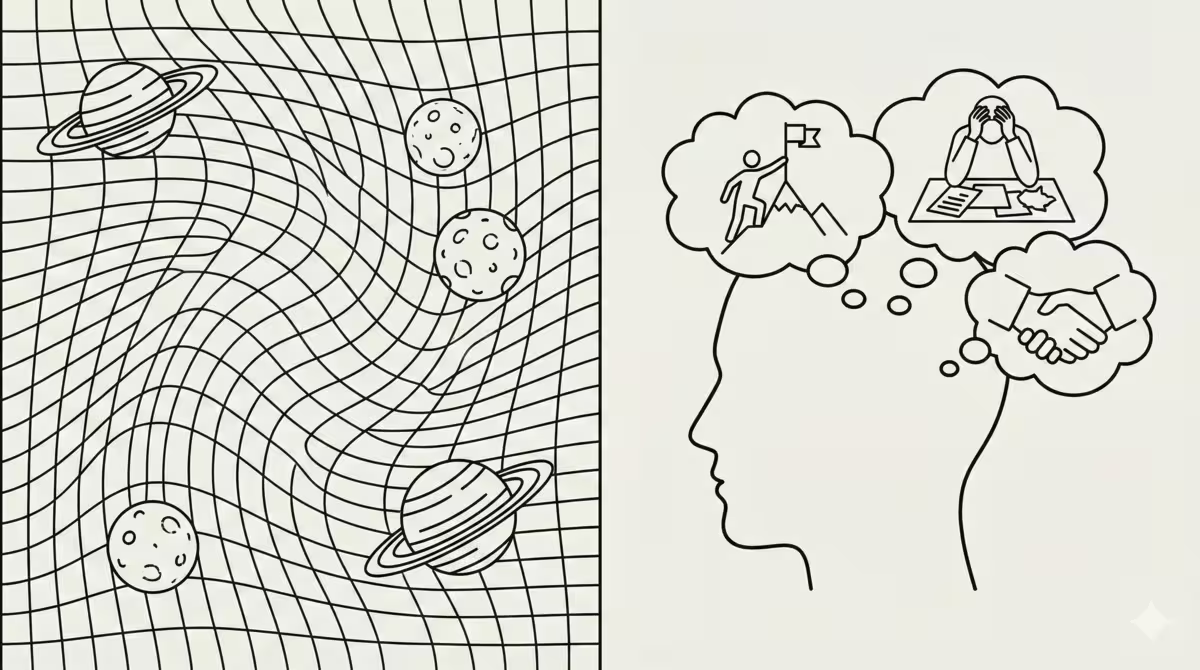The Law of Relativity: Universal Law for Turning Challenges into Opportunities

You experience the same event very differently from someone else.
A sudden downpour ruins your beach day, but saves a farmer’s crops. The rain is neutral; your perspective gives it meaning.
This is the Universal Law of Relativity in action. It says nothing is good or bad on its own, only relative to what you compare it to and how you frame it.
When you understand this, you stop seeing challenges as proof that life is against you. You start using contrast to grow, heal, and create better outcomes on purpose.
- The Universal Law of Relativity defines every situation as neutral until you compare your experience to something else and assign meaning.
- No event is good or bad. Your perspective, past, and comparisons shape how any challenge feels in your body and mind.
- Use mindfulness, journaling, gratitude, reframing, and visualization to choose supportive comparisons.
- Shifting your comparisons turns breakups, money stress, and healing triggers into proof of growth, resilience, and aligned manifestation.
What Is the Law of Relativity?
The Universal Law of Relativity says every situation is neutral until you compare it to something else or give it meaning.
Nothing is absolutely good or bad; it only feels that way because of your perspective.
Think back to the rainstorm.
The rain is neutral; your needs and expectations decide whether it feels like a blessing or a problem.
The same is true for breakups, money struggles, family conflict, and healing after abuse.
In spiritual work, the Law of Relativity invites you to step back from the story your mind tells.
You remember that your pain, fear, or shame are real, but the way you frame them is flexible.
That shift in framing is where you turn a “why me” moment into a doorway for growth, resilience, and higher vibration.

Overcoming Challenges with the Law of Relativity
You meet every challenge with your own bias and history.
Your nervous system, trauma, beliefs, and environment all shape how big a problem feels.
One person sees a breakup as proof they are unlovable, another sees the same event as an exit from a toxic pattern.
The Law of Relativity reminds you that the event itself is one piece.
How you compare it, what you focus on, and what story you attach to it decide whether it becomes a spiral or a turning point.
You cannot always choose what happens, but you can train how you relate to it.
When you work with this law, you start asking different questions.
Instead of “Why is this happening to me?” you ask, “What is this showing me compared to where I used to be?” and “What does this look like next to what others have survived and healed?”
That relative view softens shame, builds resilience, and opens space for new choices.
Is the Universal Law of Relativity the Same as Einstein’s Theory?
People often confuse the Universal Law of Relativity with Einstein’s theory of relativity.
Einstein described how time and space change depending on speed, gravity, and motion in the physical universe.
The spiritual law of relativity explains how your experience changes based on perspective, comparison, and meaning.
Both use the word “relativity,” but they speak to different levels of reality.
Physics asks how matter, energy, and time behave; spirituality asks how you relate to events, emotions, and choices.
In this article, we focus on the Universal Law of Relativity as a spiritual law you can use in healing, manifestation, and personal growth.
Discover Your Inner Self. Join Our Self-Mastery Program.
Self-Mastery Coaching gives you the space, tools, and guidance to grow, reflect and discover your values and inner strength.

Examples of the Universal Law of Relativity in Everyday Life
You understand this law best when you see it in real situations.
Relationship Example
You leave a relationship that was draining, confusing, or abusive.
At first, you feel abandoned and unworthy, compared to friends in “happy” relationships.
When you shift the comparison to where you were a year ago, how much pain you carried, and how far you have come, the same breakup becomes proof of your courage and self‑respect.
Money Example
You look at your bank account and feel behind.
You compare yourself to someone earning three times more, and shame floods your system.
When you compare your current income, skills, and support to your past or to people with fewer options, the situation feels different, and new choices open up.
Healing Example
You still get triggered by certain tones, looks, or comments.
You compare yourself to an ideal healed self who never reacts, and you judge your progress.
When you compare today’s response to how you reacted two or five years ago, you see evidence of nervous‑system healing and emotional maturity.
Each time you change what you compare to, you change how the event feels in your body and mind.
That shift is the Universal Law of Relativity working in your favor.

How to Use the Universal Law of Relativity in Daily Life
You work with this law by training how you compare and frame your experiences.
Here is a simple process you can use any time you feel stuck, triggered, or overwhelmed.
Step 1: Name the situation
Step 2: Spot your current comparison
Step 3: Choose a new comparison
Step 4: Reframe the meaning
Step 5: Take one aligned action
Use this five‑step flow with journaling, therapy, coaching, or self‑reflection, and you start using the Universal Law of Relativity as a practical tool, not only a nice concept.

Tools to Practice the Universal Law of Relativity
You lock this law in through simple, repeatable practices.
Use these tools to shift perspective, regulate your system, and support manifestation.
Mindfulness and nervous‑system regulation
Journaling and reflective questions
Gratitude with relativity
Reframing and cognitive shifting
Visualization and manifestation
Used together, these tools train your mind and nervous system to experience challenges as relative, workable material for healing and manifestation, not as fixed proof that you are stuck.
The Biggest Lesson in the Universal Law of Relativity
The biggest lesson in this law is simple. Life does not hand you fixed meanings; it hands you neutral events and asks you how you want to relate to them.
You will still feel grief, anger, fear, and disappointment. Relativity does not erase your pain; it reminds you that your pain exists inside a larger story that you can keep editing.
Every time you shift what you compare to, you soften shame and open a new choice.
For trauma survivors and highly sensitive people, this can be life‑changing.
You stop measuring yourself against unrealistic timelines, abusers, or idealized spiritual images.
You start comparing your today to your before, and to the version of you who refused to stay in dysfunction.
The Law of Relativity then becomes a daily reminder. You can ask, in any hard moment, “If this is neutral, what else could this mean, and who am I becoming because of how I choose to meet it?”

How to Use the Universal Law of Relativity for Success
Success always feels different depending on what you compare yourself to.
If you only measure against highlight reels, you will always feel behind, no matter how much you grow.
The Universal Law of Relativity helps you define success in a way that is honest and sustainable.
You compare your current results to your past, your values, and your nervous system capacity, instead of someone else’s timeline.
Subscribe to Create Higher Vibrations!
Get Inspiration and Practical advice straight to your inbox.
Try this when you think about success:
When you shift your comparison set like this, your mind stops using success as a weapon against you.
You see progress, even in hard seasons, which keeps you consistent with healing, growth, and manifestation.
FAQs About the Universal Law of Relativity
It is the idea that every situation is neutral until you compare it to something and give it meaning. When you change what you compare to, the same event can feel heavy, hopeful, or empowering.
Einstein’s theory explains how time and space behave in physics, while the Universal Law of Relativity describes how perception and comparison shape inner experience. One focuses on matter and energy; the other focuses on mindset, emotion, and meaning.
Begin by identifying what you are comparing the situation to. Then choose a fairer reference point, such as your own past, your values, or people on similar paths. Mindfulness, journaling, gratitude, reframing, visualization, and small aligned actions can support this shift.
It does not deny real harm or trauma. Instead, it explains that experience is shaped by context and comparison. You can honor pain while still choosing perspectives that support healing rather than reinforcing shame.
Yes. Manifestation and success depend on how progress is interpreted and sustained. When growth is compared to your own path rather than unrealistic standards, momentum continues and desired outcomes feel more attainable.
Final Thoughts
This law does not ask you to pretend your pain is small.
It asks you to remember that your mind always works in comparisons, and you can choose better ones.
When you feel stuck, ask three questions: “What am I comparing this to?” “How does this look compared to my past?” and “Who am I becoming because of how I meet this?”
Those questions pull you out of helplessness and back into conscious relating with your experience.
Used this way, the Universal Law of Relativity becomes a daily spiritual practice.
It helps you turn hard seasons into proof of your strength, your healing, and your commitment to a life that actually matches your values.


